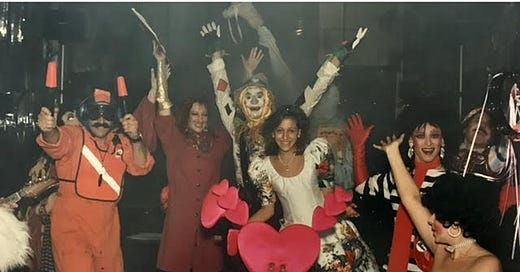This essay is part of a new collection of work inspired by the anthology On Being Jewish Now: Reflections of Authors and Advocates. Want to contribute? Instructions here. Subscribe here.
The year was 1988. The venue was Regine’s, on the Upper East Side of Manhattan. I was 13 years old. And I was trapped in a box at my own bat mitzvah.
This was not a metaphorical box. This was an actual box.
Cocktails and pigs-in-blankets were being served to my family and friends, while I—on what was supposed to be the biggest, most freeing night of my young life—was locked inside the narrow secret compartment of a “magic” box. The plan was for me to be “revealed” as a “woman” in a dramatic opening dance number featuring smoke machines, strobe lights, a Paula Abdul song, and a team of dancers that made the Village People look conservatively dressed. The cast included—but was not limited to—a Tin Man, a Cupid, a person on stilts, an angel, a Scare Crow, Betty Boop, a David Lee Roth lookalike, an adult baby and a female human-monkey in a gold dress. Thematically, these costumes were all over the place, and even at 13, I had notes.
I remained in that claustrophobic box for what could have been ten minutes or ten years. If this was what being a Jewish woman was all about, I decided, it wasn’t for me. The puffy sleeves of my Bonwit Teller dress were wilting. My blowout—which looked like a cresting tidal wave in freeze frame—was crashing. My brow (and everything else) was sweating, and my feet—not yet accustomed to torturous heels—were killing me.
Every once in a while, a dancer would press a made-up eye or a glittered lip to my minuscule air-hole and ask, “You okay in there, bat mitzvah girl?” While my heart and soul were screaming, “I can’t breathe!” and “Please, get me out of here,” I think I instinctively knew that anxiety and discomfort were destined to be an important part of my Jewish journey—so I replied by gasping, “Yup, great!” The disembodied voice would inevitably respond with something like, “Well, don’t go anywhere!” And their cackle would fade into the distance as they shimmied back to the party.
More time passed. I missed my family. I missed my friends. I missed the girl I’d been pre-box. Who was she? Could I even remember her anymore? Who was I now? Would becoming a Jewish woman make all this worth it? I used the wood panel of the box to scratch my nose, and drank my own spit to stay hydrated.
Finally, I heard guests filtering into the dining room, and knew it wouldn’t…it couldn’t…be long until the big reveal. The lights dimmed as the show began, and I could feel my box being moved to the center of the stage. I could sense the heat of the spotlight trained on the box. The door was closed, and the magician’s baton hit the side: my cue to move from my secret compartment to the front. Then—as if I had not been through enough—the magician started turning the box in circles. I didn’t remember agreeing to this.
“This is not the time to improvise!” I—notoriously prone to motion sickness—wanted to yell. He turned the box slowly at first, and then faster. And faster. And faster. Is this guy getting paid per turn? I wondered. Finally, the turning stopped. This was it. Freedom. Enlightenment. Womanhood. Judaism. Fresh air!
The door was slowly, dramatically opened to reveal: Me, in all my wilted womanly glory. Dizzy, dehydrated, dense from lack of oxygen and blinded by the spotlight, I took a step out of the box and into my bright future… and tripped in front of 300 of my closest family and friends.
Everyone was silent for a moment. I could have sworn I heard both my grandmothers gasp. I was shocked. And embarrassed. But I got up. And as my eyes adjusted to the spotlights and the strobe lights and the smoke machines around me, I smiled. I stretched out my arms and looked out at my family and friends, and I felt grateful. Grateful to not be in the box, sure, but grateful to be Jewish, grateful to be surrounded by so much love and community, even grateful to do some semblance of a conga line with a cast of characters who in no world should share a stage.
Looking back now, I realize it was the best lesson I could have gotten on the night of becoming a Jewish woman. You get put in a box? You get out. You fall? You get back up. And you don’t just get back up. You get up and you dance. And most importantly? I learned that if you are Jewish, you are never, ever alone.
JORDAN ROTER is a published novelist, screenwriter, and TV writer/producer. Roter’s third novel, a female-driven satire called Moms Like Us, for Little A/Amazon will be published May 2025.
Instagram: @jordanroterauthor
This essay is part of a new collection of work inspired by the anthology On Being Jewish Now: Reflections of Authors and Advocates. Want to contribute? Instructions here. Subscribe here.






Like a scene out of a film - so good, and empowering!
What a beautiful sentiment and article.